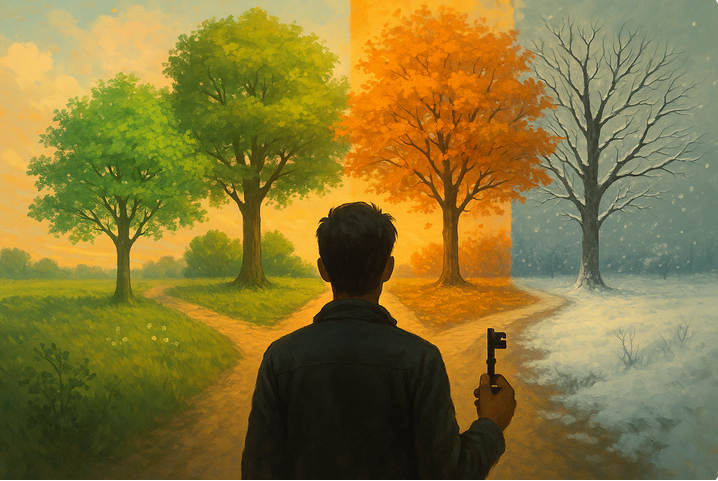The Art Of Being Alone Is A Skill
Let's Make Today A Good Day

What Is The Art Of Being Alone?
Background reading on the subject of the art of being alone is depressing. Nearly every article, of the dozens I have reviewed, assumes a negative perspective on being alone.
The inherent assumption is that being alone is automatically associated with loneliness and something to be avoided, mitigated or ameliorated, and various tips and solutions are offered to help the reader cope with being alone.
Clearly there are cases and situations where this view is valid. For example, those who are house-bound or institutionalised for reasons of physical or mental ill-health or incapacity, those who are wrongfully imprisoned, and all those experiencing extra-ordinary circumstances of enforced isolation such as the recent pandemic.
But aside from with these exceptions, for the vast majority of us, how we experience being alone is a matter of choice. This is not just a matter of opinion there is a growing body of research evidence supporting this statement.
There are other factors which may also influence your response such as personality type, age and life stage, but regardless of these factors you do have a choice as to how you respond to being alone, and your response is 100% within your control.
You may not have chosen the condition of being alone, and it may have been imposed upon you by circumstances beyond your control, but your response to the situation is within your control.
This is what is meant by the art of being alone - and it is skills based.
Mastering The Art Of Being Alone
[1] Duality - As we live in a world of duality, periods of being alone are inevitable.
You can not experience up without down, hot without cold, black without white, noise without silence and therefore you can not experience "together" without "alone".
Being alone can not be avoided. It is a natural experience. The issue is not with the condition it is with your response to it.
[2] Paradox - You can not master the art of being alone until you have mastered the art of not being alone.
Most of the online tips and guidance on how to be alone miss the point unless they ensure that you have the necessary skills to not be alone.
It's rather like being offered tips on how to clap with one hand!
Reinforcing an inadequacy does not solve the underlying long-term problem.
There is comfort and reassurance in knowing that you have the skills to attract company, to make friends and to not be alone as and when you have the opportunity to do so, and when you choose to.
[3] Habit - The skills involved in mastering the art of being alone need to become habits in order to deliver lasting benefits.
These habits need to deeply ingrained and form part of your unconscious competence.
James Clear describes them as Atomic Habits - which are comprised of small and seemingly insignificant changes that will compound into remarkable results if you persist with them consistently over many years.
[4] Compounding - The long term positive effect of mastering these habits is exponential.
This is a harsh thing to say - but no-one suddenly became a difficult, cantankerous miserable old man or woman overnight. People like this have always been like this to some degree.
The same is as true of the old man who behaves as a charming, and friendly gentleman or the little old lady who everyone describes in the UK as being "sweet" or in the US as a real "honey".
As we get older, our patterns of thought and behaviour become more ingrained and more pronounced.
To put it bluntly, our misery or happiness has been a choice.
[5] Long Game - Mastering the art of being alone is like playing a long game.
The long game is an approach to any area of life where you are prepared to sacrifice short term gains in order to achieve long-term wins.
So in practical terms this means that when you are alone, rather that constantly seeking to amuse or distract yourself in any of the usual ways, you take the long view and put in the work to master the art of being alone.
We engage in financial planning for our long term future.
We invest in savings plans, pensions schemes and we build investment portfolios.
Isn't it strange that we rarely, if ever, plan for our long term social future?
Practical Tips
[1] The art of having company

I have lived and worked away from home for considerable periods of my life, both in the UK and extensively in S.E.Asia and I feel qualified to comment on this from my own direct experiences.
The first set of tips are what I refer to as "software tips"
These are to do with your mind, your attitudes and how you think:
- We have more in common than that which divides us - regardless of ethnicity, age, colour, class or creed - as human beings we fundamentally all have the same needs, wants and desires. So have an outlook towards people that reflects this.
- Make the first move - people will respond to you in like manner to the way you approach them - this is known as mirrored reciprocation.
- Adopt a growth mindset - take the view that there is always something knew to learn and that regardless of your age and stage in life there are always opportunities for personal growth. The world is an interesting and fascinating place, as are the people in it, so go "off-piste", try new things, be daring.
- Be present - learn how to break free from habitual patterns of thought and behaviour - learn how to be really present with people - adopt the beginners mind.
**********************
The second set of tips are what I call "Infrastructure Tips"
- Establish regular fixed "ports of call". When I first go to a new place I scout around and find the shops, bars, restaurants, gyms and general "watering holes" where I am going to go to buy everyday items, to eat and to drink, to exercise and to relax.
- Establish a routine. When I go to these places I do so regularly and I establish basic set patterns of behaviour. I very quickly start to look and behave "like a regular" and not just another "ang mo" or "farang" passing through. People are creatures of habit and it will pay you social dividends for people to become familiar with you in this way.
- Talk to the staff and regulars - make the first move [see above] and engage people in conversation. Talk to the staff, talk to other guests and customers etc. Be friendly and people will respond to you in a similar way.
People really are creatures of habit and it is surprising how quickly you can get known to, and get to know, other people by acting in alignment with this reality.
Obviously we are not talking about building in-depth relationships at this stage here, but rather this is about establishing a social infrastructure and creating an environment where, over time, that can and will take place.
[2] The art of being alone

Having mastered the art of not being alone let's take a look at the art of being alone.
Again, from considerable experience of having been, or felt, alone for long periods of time, my advice is to lay down some very solid foundations for being on your own.
These are my 4 practices on which I base my approach to the the art of being alone:
- Mindfulness - In my personal experience, the practice of mindfulness is one of most effective remedies for reducing stress, gaining perspective and allowing space for new ideas and new insights to emerge.
- Acceptance - The power of acceptance is the freedom that it gives me from the tyranny of my thoughts and emotional responses to the events and circumstances of my life - and this can include the experience of being alone. It unfuses my thinking mind from my observing mind, and it unhooks my dependence on a change in outer circumstances before I can make an inner change.
- Framing - If I can change the way I mentally characterize a situation it has a profound impact on how I respond to it emotionally.
- Gratitude - I find that the practice of gratitude is transformative and especially the advanced practice of giving thanks in everything. As with each of these practices this a discipline, but the effect of it is that it takes my focus away from me.
These practices create the space for me to enjoy the art of being alone and to be productive and creative in my work in writing articles for this website.
Further Reading
If you are experiencing some tough times in your time alone, I offer you the following articles for further reading - they may offer additional insights into the art of being alone:
- The Stockdale Paradox - How To Deal With The Attrition Factor
- This Too Shall Pass -The Blessing And The Curse Of Impermanence
- Recognising Limbo As A Stage Of Transition
- On Becoming The Ferryman
- Be The Light At The End Of Someone Else's Tunnel
Next Article: Intuition & Anxiety - Are There Angels Or Devils Calling Here?
Return from "The Art O Being Alone" to: Walking The Talk
LATEST ARTICLES
Master The Season You Are In - The Key to Fulfilling Your Purpose
 To fulfil your purpose, you must first master the season you are in. One of the biggest mistakes you can make in life is focusing all your energy on the next season instead of learning to master the s…
To fulfil your purpose, you must first master the season you are in. One of the biggest mistakes you can make in life is focusing all your energy on the next season instead of learning to master the s…The Inner Weight of Shame - Sustained By Attentional Fixation
 A Mind That Is Continuously Engaged In Self-Surveillance. Shame is one of the heaviest inner burdens a human being can carry. It does not announce itself loudly or demand attention through drama. Inst…
A Mind That Is Continuously Engaged In Self-Surveillance. Shame is one of the heaviest inner burdens a human being can carry. It does not announce itself loudly or demand attention through drama. Inst…Does Prayer Work? The Psychology of Prayer, Meditation and Outcomes
 Reality Is A Complex System Of Countless Interactions - Including Yours. So does prayer work? The problem is that the question itself is usually framed in a way that guarantees confusion. We tend to a…
Reality Is A Complex System Of Countless Interactions - Including Yours. So does prayer work? The problem is that the question itself is usually framed in a way that guarantees confusion. We tend to a…Living in Survival Mode Without Surrendering Mental Authority
Living in Survival Mode Without Surrendering Mental Authority
 Clear Thinking When You’re Just Trying to Stay Afloat. Many people today are overwhelmed because they are living in survival mode - not temporarily, but as a persistent condition of life. For many, th…
Clear Thinking When You’re Just Trying to Stay Afloat. Many people today are overwhelmed because they are living in survival mode - not temporarily, but as a persistent condition of life. For many, th…Manifestation Without Magic: A Practical Model
 Manifestation without magic is not a softer or more intellectual version of popular manifestation culture. It is a different model altogether. Popular manifestation teachings tend to frame reality as…
Manifestation without magic is not a softer or more intellectual version of popular manifestation culture. It is a different model altogether. Popular manifestation teachings tend to frame reality as…Staying Committed When You Can't See Progress - The Psychology of Grit
 Uncertainty Is Not The Absence Of Progress, Only The Absence Of Reassurance. One of the most destabilising experiences in modern life is not failure, but uncertainty and staying committed when you can…
Uncertainty Is Not The Absence Of Progress, Only The Absence Of Reassurance. One of the most destabilising experiences in modern life is not failure, but uncertainty and staying committed when you can…The Battle For Your Mind - How To Win Inner Freedom In A Digital Age Of Distraction
 From External Events to Inner Events. We often think of “events” as things that happen out there: the traffic jam, the rude comment, the delayed email reply. But what truly shapes our experience is wh…
From External Events to Inner Events. We often think of “events” as things that happen out there: the traffic jam, the rude comment, the delayed email reply. But what truly shapes our experience is wh…How to See Your Thoughts Without Becoming the Story
 A Practical Guide to Thought-Awareness. You can spend your life inside the stories of your mind without ever learning how to see your thoughts clearly and objectively. Most of the stuff we tell oursel…
A Practical Guide to Thought-Awareness. You can spend your life inside the stories of your mind without ever learning how to see your thoughts clearly and objectively. Most of the stuff we tell oursel…The Collison Decision Matrix - A Simple Framework for Better Choices
 The Collison Decision Matrix Is A Practical Everyday Thinking Tool. Most of us spend a surprising amount of time worrying about decisions. From small ones such as what to wear, what to eat, what to te…
The Collison Decision Matrix Is A Practical Everyday Thinking Tool. Most of us spend a surprising amount of time worrying about decisions. From small ones such as what to wear, what to eat, what to te…The Power Of Asking The Right Question
 The Power Of Asking The Right Question Lies In The Quest For Insight. To experience the power of asking the right question you must develop the practice of asking questions. The best way to improve th…
The Power Of Asking The Right Question Lies In The Quest For Insight. To experience the power of asking the right question you must develop the practice of asking questions. The best way to improve th…Site Pathways
 Here is a site pathway to help new readers of Zen-Tools navigate the material on this site. Each pathway is based around one of the many key themes covered on this site and contain a 150 word introduc…
Here is a site pathway to help new readers of Zen-Tools navigate the material on this site. Each pathway is based around one of the many key themes covered on this site and contain a 150 word introduc…